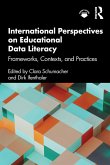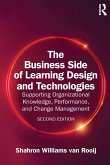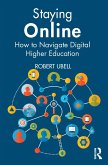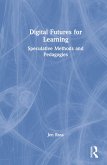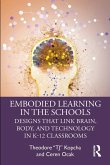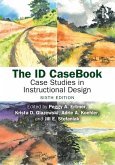- Gebundenes Buch
- Merkliste
- Auf die Merkliste
- Bewerten Bewerten
- Teilen
- Produkt teilen
- Produkterinnerung
- Produkterinnerung
The COVID-19 pandemic pushed education from schools to educational technologies at a pace and scale with no historical precedent. For hundreds of millions of students formal learning became fully dependent on technology â whether internet-connected digital devices, televisions or radios.
Andere Kunden interessierten sich auch für
![International Perspectives on Educational Data Literacy International Perspectives on Educational Data Literacy]() International Perspectives on Educational Data Literacy62,99 €
International Perspectives on Educational Data Literacy62,99 €![International Handbook of E-Learning Volume 2 International Handbook of E-Learning Volume 2]() International Handbook of E-Learning Volume 2428,99 €
International Handbook of E-Learning Volume 2428,99 €![The Business Side of Learning Design and Technologies The Business Side of Learning Design and Technologies]() Shahron Williams van Rooij (USA George Mason University)The Business Side of Learning Design and Technologies54,99 €
Shahron Williams van Rooij (USA George Mason University)The Business Side of Learning Design and Technologies54,99 €![Staying Online Staying Online]() Robert UbellStaying Online43,99 €
Robert UbellStaying Online43,99 €![Digital Futures for Learning Digital Futures for Learning]() Jen RossDigital Futures for Learning149,99 €
Jen RossDigital Futures for Learning149,99 €![Embodied Learning in the Schools Embodied Learning in the Schools]() Theodore â TJâ KopchaEmbodied Learning in the Schools53,99 €
Theodore â TJâ KopchaEmbodied Learning in the Schools53,99 €![The ID CaseBook The ID CaseBook]() The ID CaseBook65,99 €
The ID CaseBook65,99 €-
-
-
The COVID-19 pandemic pushed education from schools to educational technologies at a pace and scale with no historical precedent. For hundreds of millions of students formal learning became fully dependent on technology â whether internet-connected digital devices, televisions or radios.
Hinweis: Dieser Artikel kann nur an eine deutsche Lieferadresse ausgeliefert werden.
Hinweis: Dieser Artikel kann nur an eine deutsche Lieferadresse ausgeliefert werden.
Produktdetails
- Produktdetails
- Verlag: Taylor & Francis Ltd
- Seitenzahl: 656
- Erscheinungstermin: 9. Oktober 2025
- Englisch
- Abmessung: 241mm x 170mm
- Gewicht: 1508g
- ISBN-13: 9781041123675
- ISBN-10: 1041123671
- Artikelnr.: 74172431
- Herstellerkennzeichnung
- Libri GmbH
- Europaallee 1
- 36244 Bad Hersfeld
- gpsr@libri.de
- Verlag: Taylor & Francis Ltd
- Seitenzahl: 656
- Erscheinungstermin: 9. Oktober 2025
- Englisch
- Abmessung: 241mm x 170mm
- Gewicht: 1508g
- ISBN-13: 9781041123675
- ISBN-10: 1041123671
- Artikelnr.: 74172431
- Herstellerkennzeichnung
- Libri GmbH
- Europaallee 1
- 36244 Bad Hersfeld
- gpsr@libri.de
Mark West is an education specialist at UNESCO, the United Nations Educational, Scientific and Cultural Organization, where he researches and writes about education with a special focus on technology. He advises governments, international organizations and civil society groups about opportunities and risks for education in an age of accelerating digital change. Prior to joining UNESCO, Mr. West worked as a journalist, history teacher and teacher trainer. He is a graduate of Stanford University and a former Fulbright Fellow. In addition to an An Ed-Tech Tragedy?, Mr. West is the author of numerous UNESCO publications about technology and education, including I'd Blush if I Could and Reading in the Mobile Era. I'd Blush if I Could prompted Apple and other large technology companies to make changes to the way AI voice assistants project gender. It clarified how education can help close digital gender divides and was praised by experts and media outlets around world. Reading in the Mobile Era brought international attention to the ways governments, schools and families can leverage inexpensive mobile technologies to help advance literacy.
INTRODUCTION: Defining ed-tech
The origins and rise of ed-tech
Ed-tech and technology solutionism
Why tragedy?
Situating the disruption
A Netflix moment for commercial ed-tech Act 1: THE HOPE OF TECH SALVATION: Reformatting schools with technology
Cut the red tape and catapult education to a better future Act 2: FROM PROMISES TO REALITY: Most learners were left behind
Inequalities were supercharged
Learners engaged less, achieved less and left state-provisioned education
Education was narrowed and impoverished
Immersion in technology was unhealthy
Environmental tolls multiplied with the ed-tech boom
The private sector tightened its grip on public education
Surveillance, control and machine processes marked the move to ed-tech Inter-Act: LOOKING BACK TO SEE AHEAD : School closures, the shift to remote learning and public health
Did technology-mediated remote learning contribute to the prolongation of school closures?
If not ed-tech, then what?
Was COVID-19 an education crisis?
Ed-tech finds a new rationale - resilience Is technology a pillar of educational resilience?
If ed-tech is the answer, what is the question? Act 3: NEW DIRECTIONS FOR ED-TECH: Prioritize the best interests of students and teachers
Reaffirm the primacy of in-person learning
Strengthen digital connectivity, capacities and content
Protect the right to education from shrinking ground CONCLUSION: Remembering the ed-tech experiences of the pandemic
The arc of tragedy
Reorienting and steering the digital transformation of education
The origins and rise of ed-tech
Ed-tech and technology solutionism
Why tragedy?
Situating the disruption
A Netflix moment for commercial ed-tech Act 1: THE HOPE OF TECH SALVATION: Reformatting schools with technology
Cut the red tape and catapult education to a better future Act 2: FROM PROMISES TO REALITY: Most learners were left behind
Inequalities were supercharged
Learners engaged less, achieved less and left state-provisioned education
Education was narrowed and impoverished
Immersion in technology was unhealthy
Environmental tolls multiplied with the ed-tech boom
The private sector tightened its grip on public education
Surveillance, control and machine processes marked the move to ed-tech Inter-Act: LOOKING BACK TO SEE AHEAD : School closures, the shift to remote learning and public health
Did technology-mediated remote learning contribute to the prolongation of school closures?
If not ed-tech, then what?
Was COVID-19 an education crisis?
Ed-tech finds a new rationale - resilience Is technology a pillar of educational resilience?
If ed-tech is the answer, what is the question? Act 3: NEW DIRECTIONS FOR ED-TECH: Prioritize the best interests of students and teachers
Reaffirm the primacy of in-person learning
Strengthen digital connectivity, capacities and content
Protect the right to education from shrinking ground CONCLUSION: Remembering the ed-tech experiences of the pandemic
The arc of tragedy
Reorienting and steering the digital transformation of education
INTRODUCTION: Defining ed-tech
The origins and rise of ed-tech
Ed-tech and technology solutionism
Why tragedy?
Situating the disruption
A Netflix moment for commercial ed-tech Act 1: THE HOPE OF TECH SALVATION: Reformatting schools with technology
Cut the red tape and catapult education to a better future Act 2: FROM PROMISES TO REALITY: Most learners were left behind
Inequalities were supercharged
Learners engaged less, achieved less and left state-provisioned education
Education was narrowed and impoverished
Immersion in technology was unhealthy
Environmental tolls multiplied with the ed-tech boom
The private sector tightened its grip on public education
Surveillance, control and machine processes marked the move to ed-tech Inter-Act: LOOKING BACK TO SEE AHEAD : School closures, the shift to remote learning and public health
Did technology-mediated remote learning contribute to the prolongation of school closures?
If not ed-tech, then what?
Was COVID-19 an education crisis?
Ed-tech finds a new rationale - resilience Is technology a pillar of educational resilience?
If ed-tech is the answer, what is the question? Act 3: NEW DIRECTIONS FOR ED-TECH: Prioritize the best interests of students and teachers
Reaffirm the primacy of in-person learning
Strengthen digital connectivity, capacities and content
Protect the right to education from shrinking ground CONCLUSION: Remembering the ed-tech experiences of the pandemic
The arc of tragedy
Reorienting and steering the digital transformation of education
The origins and rise of ed-tech
Ed-tech and technology solutionism
Why tragedy?
Situating the disruption
A Netflix moment for commercial ed-tech Act 1: THE HOPE OF TECH SALVATION: Reformatting schools with technology
Cut the red tape and catapult education to a better future Act 2: FROM PROMISES TO REALITY: Most learners were left behind
Inequalities were supercharged
Learners engaged less, achieved less and left state-provisioned education
Education was narrowed and impoverished
Immersion in technology was unhealthy
Environmental tolls multiplied with the ed-tech boom
The private sector tightened its grip on public education
Surveillance, control and machine processes marked the move to ed-tech Inter-Act: LOOKING BACK TO SEE AHEAD : School closures, the shift to remote learning and public health
Did technology-mediated remote learning contribute to the prolongation of school closures?
If not ed-tech, then what?
Was COVID-19 an education crisis?
Ed-tech finds a new rationale - resilience Is technology a pillar of educational resilience?
If ed-tech is the answer, what is the question? Act 3: NEW DIRECTIONS FOR ED-TECH: Prioritize the best interests of students and teachers
Reaffirm the primacy of in-person learning
Strengthen digital connectivity, capacities and content
Protect the right to education from shrinking ground CONCLUSION: Remembering the ed-tech experiences of the pandemic
The arc of tragedy
Reorienting and steering the digital transformation of education


